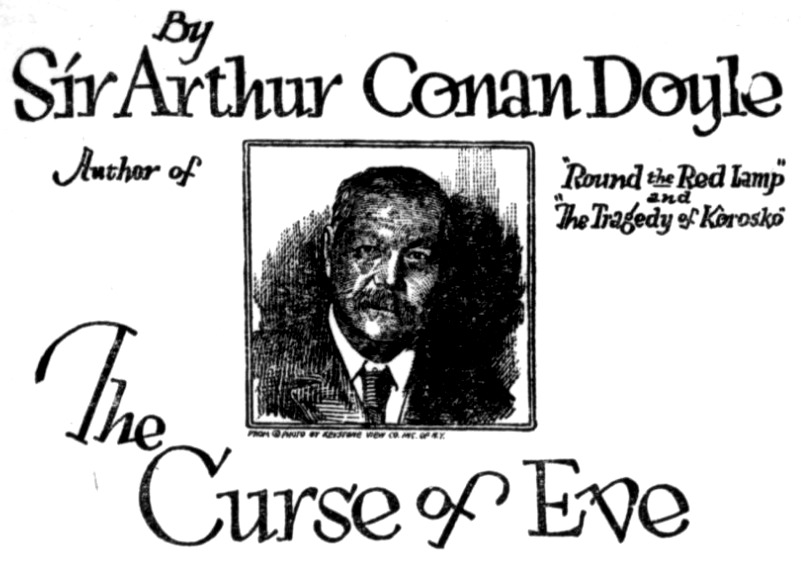
THE CURSE OF EVE
Robert Johnson was an essentially commonplace man, with no feature todistinguish him from a million others. He was pale of face, ordinary inlooks, neutral in opinions, thirty years of age, and a married man. Bytrade he was a gentleman’s outfitter in the New North Road, and thecompetition of business squeezed out of him the little character thatwas left. In his hope of conciliating customers, he had become cringingand pliable, until working ever in the same routine from day to day, heseemed to have sunk into a soulless machine rather than a man. No greatquestion had ever stirred him. At the end of this snug century,self-contained in his own narrow circle, it seemed impossible that anyof the mighty, primitive passions of mankind could ever reach him. Yetbirth, and lust, and illness, and death are changeless things, and whenone of these harsh facts springs out upon a man at some sudden turn ofthe path of life, it dashes off for the moment his mask of civilizationand gives a glimpse of the stranger and stronger face below.
Johnson’s wife was a quiet little woman, with brown hair and gentleways. His affection for her was the one positive trait in his character.Together they would lay out the shop window every Monday morning, thespotless shirts in their green cardboard boxes below, the neckties abovehung in rows over the brass rails, the cheap studs glistening from thewhite cards at either side, while in the background were the rows ofcloth caps and the bank of boxes in which the more valuable hats werescreened from the sunlight. She kept the books and sent out the bills.No one but she knew the joys and sorrows which crept into his smalllife. She had shared his exultations when the gentleman who was going toIndia had bought ten dozen shirts and an incredible number of collars,and she had been as stricken as he when, after the goods had gone, thebill was returned from the hotel address with the information that nosuch person had lodged there. For five years they had worked, buildingup the business, thrown together all the more closely because theirmarriage had been a childless one. Now, however, there were signs that achange was at hand, and that speedily. She was unable to comedownstairs, and her mother, Mrs. Peyton, came over from Camberwell tonurse her and to welcome her grandchild.
Little qualms of anxiety came over Johnson as his wife’s timeapproached. However, after all, it was a natural process. Other men’swives went through it unharmed, and why should not his? He was himselfone of a family of fourteen, and yet his mother was alive and hearty. Itwas quite the exception for anything to go wrong. And yet in spite ofhis reasonings the remembrance of his wife’s condition was always like asomber background to all his other thoughts.
Doctor Miles of Bridport Place, the best man in the neighborhood, wasretained five months in advance, and, as time stole on, many littlepackages of absurdly small white garments with frill work and ribbonsbegan to arrive among the big consignments of male necessities. And thenone evening, as Johnson was ticketing the scarfs in the shop, he heard abustle upstairs, and Mrs. Peyton came running down to say that Lucy wasbad and that she thought the doctor ought to be there without delay.
It was not Robert Johnson’s nature to hurry. He was prim and staidand liked to do things in an orderly fashion. It was a quarter of a milefrom the corner of the New North Road w